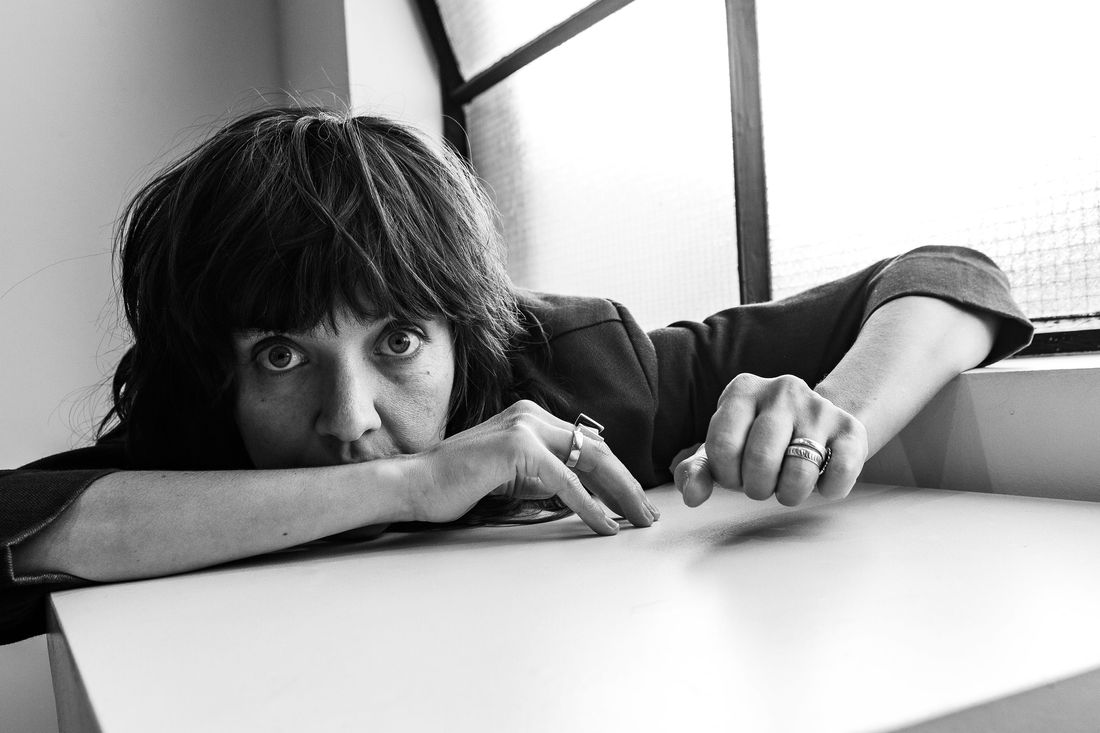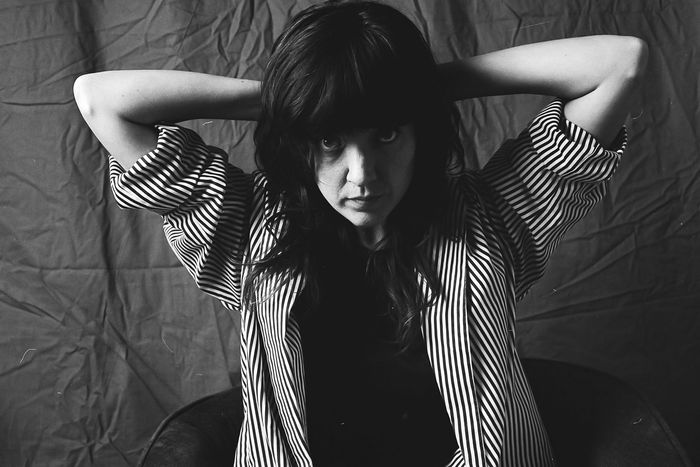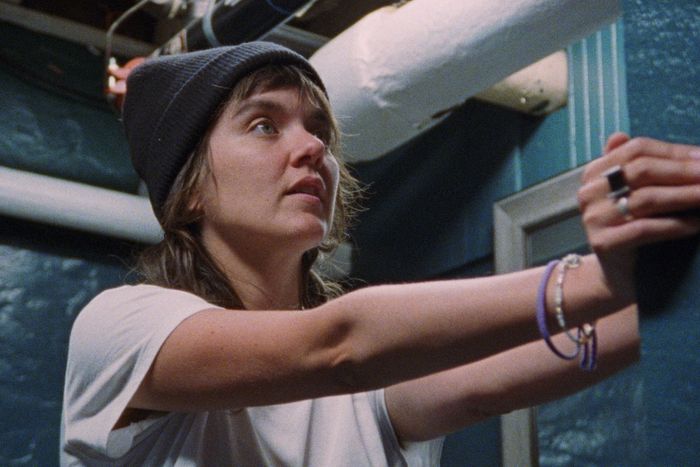
There is irony in conducting an interview with the press-shy Courtney Barnett timed to her new documentary, which details, among many things, how unpleasant it can be to do press. Even the setup for this conversation — a well-meaning exchange between two strangers with unlimited potential for awkwardness from both parties — feels like one of Barnett’s songs.
During our discussion, however, the beloved Grammy-nominated musician was upbeat and engaged, taking her time picking just the right words as if she was discovering how she felt as she spoke. (Yes, she talks exactly like how she sings.) It didn’t hurt that she was sitting outdoors in Joshua Tree as the California sunset colored an endless sky to create a stunning Zoom background; we both acknowledged that the star of the hour was the landscape.
“I’m just glad it’s not too windy,” she says with a smile.
The conflict between being thankful and weirded out by indie-rock fame is at the heart of Danny Cohen’s new documentary Anonymous Club, which makes its U.S. debut at this year’s SXSW and will hit theaters in August. Anonymous Club is essentially an audio diary: Barnett recorded off-the-cuff thoughts with a dictaphone gifted to her by Cohen, which were then used to narrate hours of beautiful 16-mm film capturing the three years covering the Australian musician’s grueling world tour for Tell Me How You Really Feel to the recording of last year’s Things Take Time, Take Time. The film doesn’t reinvent the tour documentary (surprise: Fame is surreal, touring is a slog), but like Barnett’s best songs, it captures little moments to paint a picture of life rather than convey any single message or meaning. The documentary also feels like an explanation for the low-key calmness of Take Time, which initially divided Barnett fans between those who enjoyed her pivot to drum machines (provided by co-producer Stella Mozgawa) and C86 guitar tones and those who wanted another fast-and-furious “Pedestrian at Best.”
For Barnett, talking in Joshua Tree also brings her latest LP full circle. Many of the songs were born there at the start of 2020 while she played shows around Los Angeles before returning to Australia for COVID lockdown and to finish the album. She highlights “Splendour” and “Sunfair Sundown” as especially desert-y, with the latter’s artificial sunshine feeling like a relative to Vampire Weekend’s Father of the Bride, another record that uses California as a metaphor for one’s 30s. But even that grasp for a narrative feels like a stretch for Barnett, who makes it clear that she writes songs simply to capture whatever is in front of her.
“I’m just excited for people to hear the songs,” says Barnett. “They kind of have that different life as soon as other people hear them. It’ll be nice to kind of let them go a bit.”
The note I wrote after first hearing “Turning Green”: “If ‘Spiders (Kidsmoke)’ went to therapy.”
[Laughs] Yeah, totally. I love Wilco. When you know that musicians can do so much but they don’t always do it. They know when to hold back and when to let loose. Both songs got that Krautrock thing going.
Do other bands come to mind for you that can hold back tastefully?
Not that I can instantly think of. Maybe more performance-wise than studio-wise, but when I get on a stage, I have this nervous energy, so I play faster and louder. I really admire people who can just get onstage with this calmness. The audience leans into them instead of the other way around. I saw Cate Le Bon play recently and she did exactly that. And I can imagine Leonard Cohen doing it too. I saw Arlo Parks play acoustically the other day, just a duo set.
I’m glad you mentioned Cohen. I love your cover of “So Long, Marianne.”
I love that song so much. Beautiful.
In an interview you did about covering “I’ll Be Your Mirror” for the Velvet Underground & Nico tribute album, you said you found it harder to cover songs as you’ve gotten older. Where does that challenge come from?
I’m not sure what that is. Probably just a deeper something. When I was a kid and learning guitar, I used to just find the chords on the internet to every song I knew and sing along to them. I’d be singing weird lyrics that I could not relate to, or I didn’t really think about, because I was just playing the song. But I think to really embody a song and turn it into your own or try to present it in a respectful and honest way, you need to have some through-line of understanding or emotional connection.
Is there a song or an artist you love but would never want to cover?
There are lots. [Laughs] And I think for many different reasons. But I find it harder to find songs that I really want to cover.
Things Take Time, Take Time is mostly you and drummer Stella Mozgawa playing all the instruments. Did you have a sense from the start of how these songs would eventually sound with the full band?
The last few albums, I have written and recorded with this little voice in the back of my mind saying, “How are we going to perform that live?” Sometimes it’s very sensible, but also it restricts you in certain ways. I’ve never really played all my albums true to the studio version. I don’t think it’s that important. But I think this time in the studio, that thought was far from my mind. Because with COVID, it felt impossible to look into the future. Even the release of the album, let alone the touring of the album, just seemed so uncertain. It was this nice excuse to not really think about it, but also because we were playing all the instruments, it’s humanly impossible to make it sound like it was a completely live recording. I think I was more focused on just creating beautiful, luscious, warm sounds than worrying about the other stuff too much.
I’m sure there’s also a level of success now where if you decide to tour with this sound of the record, you can find the right people to join you. You can make that ideal setup more possible than when touring behind those first EPs with just a drummer and bass.
Yeah, definitely. I mean still, I did a tour with a fourth member, and this album will have a fourth member onstage. Over the years, I’ve had rotating guitarists or keyboard players. It’s so enjoyable musically and hanging out and all that, but it is another part of the budget that comes into play.
But yeah, it’s always fun to see how different songs can be. I would love to have a Bad Seeds–size band, a little three-piece choir or a two-piece string section. I think I gotta wait maybe a couple of albums until it’s more accessible. There’s obviously something very powerful and magical about the three-piece layout. But I think it’s just so fun, the flexibility of it all, and being able to present songs in so many different ways, so that there’s not just one eternal version.
Now that you have the resources, are there any songs that you originally envisioned to be massive that you now want to be massive?
Ah, good question! Not that comes to mind or not that keeps me up at night. But I’m sure — songs always surprise me.
So we’re not going to get “Avant Gardener” with a 500-person choir?
Yeah, I don’t think so.
What do you look for when you’re working with other people?
I think I still need a little bit of personal connection or friendship. I think as much as there are artists that if they called me up and asked me to work with them, I’d be like, “Yes, of course,” I probably would be scared to go out seeking it. It’s dating or something. It’s very awkward. I think for me, where I’m at now, I just need a little bit of friendship or some sort of understanding — as well as someone who I greatly admire, obviously, musically and songwriting-wise — but also someone that is different enough from me that they will kind of push me outside my comfort zone and is someone that I will learn something from.
Could you name someone whom you felt challenged you in that way?Making the album with Kurt Vile was fun because it wasn’t hugely different musically, but it was enough to work with a new person. That was really just a fun project. We made a lot of it up on the spot. That was enough outside my comfort zone, of just kind of going into the studio being not as prepared as I normally might be, but seeing what kind of weird and wonderful stuff happens.
I haven’t done that many collaborations, really. I mean, the newest one would be my album. I feel like it was a real collaboration with Stella. We co-produced it and played all the instruments. I think her style and knowledge are close but different from mine. I’m really inspired by her musically. So it was, again, just enough to keep me on my toes and not leaning on musical patterns that I may have had in the past.
I was playing with your new album’s stem mixer, which was a lot of fun. What was the hope you had for people checking it out?
It came up in conversations around the things we could do with the album, and I just thought it was such a fun idea. I think someone also suggested putting the actual stems out so people could remix the songs. I thought that seemed to be this extra level of difficulty, and there was something about this that was more accessible. I think it’s this nice way of anybody being able to take apart the song. I love hearing how people write songs and where the ideas come from and all the layers .
Is there an album you’d love to get your hands on the stems?
Oh my God. That’s a really good thought. I remember I was in a studio once and they brought up a Nirvana album and soloed certain parts to me and that blew my younger self’s mind.
I’ve always liked vocals, especially solo. They’re just so revealing, you know? Even old Nina Simone tracks or something. I’d love to hear her voice soloed. There’s that Prince album that’s just him and a piano and it all just bleeds into each other. And Keith Jarrett — this is not answering your question, I’m talking about albums I like when you can hear the tracks — it’s The Köln Concert and he’s playing the piano and you can hear his foot tapping on the ground and you can hear him making little noises in between.
Was it true that before that show Jarrett was really hurt?
I’m pretty sure the story is that the piano he had requested was not available. He showed up to the show and there was this cheaper piano — not the piano he wanted, and it didn’t have the sustain pedal or something like that. It was a bit broken and a bit shit, and he was kind of mad. That’s why he does all these different things: because he didn’t have the pedal, so he played bits differently to let the notes ring out or the chords ring out. I love finding that out because it paints this whole different version of events.
“Oh, I have a broken piano. Fine, I’ll make a classic record.”
There’s something really special about working within those restrictions. I love hearing stories like that because sometimes when we have restrictions or parameters, we’re forced to think outside the box.
Is there a future restriction you’d like to try for your own songwriting?
This album felt a little bit outside in a way because of circumstance. I was in the studio in Sydney, and I live in Melbourne, so I only had my electric guitar and an acoustic guitar, and I didn’t take any pedals or amps, so I was making do with what was in the studio and my guitar was a bit fucked. It was constantly going out of tune, and I just couldn’t get it to sound good. I ended up not playing that much guitar just because I couldn’t get it right, so I sat on the Wurlitzer or the piano instead. Because of certain parameters, which weren’t really on purpose, it created this different sound or this different space. Something like “Turning Green” — it started off as a guitar song and then I hated the sound of it, so I played the Wurlitzer and Stella did the bass and drums, and it became this whole other idea.
Back to talking about the stems, I like playing with the idea that records and songs are final and untouchable artifacts, and that you can’t mess with them.
There’s this pressure of making the perfect album because an album is so … what’s the word? It lasts forever. And there’s personal pressure. And I’m quite an indecisive person. It’s this horror of, “Oh my God, this little thing, this little CD is going to be kicking around in a library — some kid is gonna borrow the CD from the library in 50 years.” But that’s how I started discovering music. I’d go to the library and borrow albums that had covers I liked the look of. That’s how I discovered a lot of music. So it’s this weird thought that this one thing you do over a matter of ten days in a studio is existing in the world, whether it’s in a landfill or a library. It’s a document of time.
But yes, I think once I let go of that idea, and once you can embrace the fact that a song is fluid and could exist in so many different forms, then yeah, it’s quite freeing, because it’s essentially a story set to music that gets passed along and changes over time.
“Three Packs a Day” is my favorite song of yours, and I love all your non-LP singles. Would you ever release a Louder Than Bombs–like collection?
In the quiet moments of the last year and a half, I definitely thought more about that. I’m sure one day that would be fun. All those songs exist, but when they’re not on an album, they kind of get lost. It’d be fun to one day put them somewhere.
The new Anonymous Club documentary seemed like it was filmed during an intense period of your life. Are you glad you went through so much documentation of yourself?
I’m glad I documented that time. It was challenging to go through the process and then watch it back and see yourself and the person you are versus the person you think you are. It’s always confronting to see yourself through someone else’s eyes, and that’s the most extreme version that we can do that.
Was this version of yourself so shocking or different than what you were imagining?
[Laughs] Not shocking. Just small moments. It’s like, we should want that as we’re growing as humans, to see those little things. It’s not shocking things that I hate about myself, but it’s just little things that I would like to improve within myself or change within myself or whatever it is. And I think that’s only ever a good thing.
Is there a mundane part of life you’ve always wanted to try and articulate in a song?
Not really. I think there’s just so much, you know? There’s so much to write about, there’s so much to focus on. I think a lot of it is subconscious for me of these recurring themes. I mean, there are definitely intentional things. But a lot of the reason why I write is just to understand, to learn about things around me or people around me.
Relistening to all your records, I was struck by how much empathy I hear in your lyrics. This kind of direct kindness is not something I usually hear in most indie rock, which can often come across as snarky or ironic.
Empathy seems like such a no-brainer for me. It seems so crucial to living and to understanding people — trying to understand people — and living in a community and a society. I think just stopping and considering other people.
What does empathy sound like in someone else’s music?
I was just thinking as you were saying that. I think when we lack empathy, it comes from a place of fear. Sometimes I think those things are just survival. It’s almost like I’m just in complete denial of something, or we’re convincing ourselves that we’re right or that we know everything. But the musicians or songwriters I really find interesting, or the people that I find interesting, are people who can — I guess it just blows my mind that people can be so decisive or can know everything. [Laughs] Or, I don’t know. How can you know everything?
I think it’s a balance of all those things and being able to look at yourself or a situation almost in an unbiased … well, that’s not always fair, because sometimes telling a story with your own emotional input, if that’s the way you’re feeling about something, then it’s not right or wrong. We share stories so that we can have that shared experience or a universal experience.
This interview has been condensed and edited for clarity.



